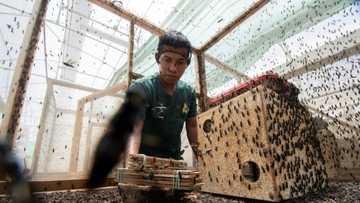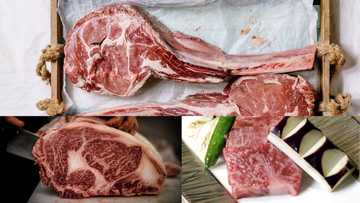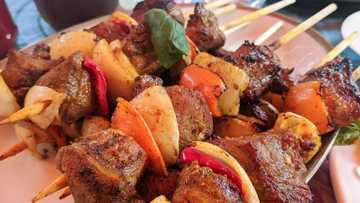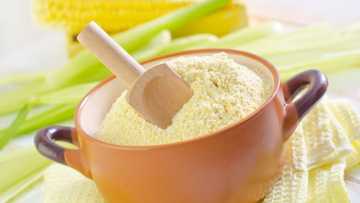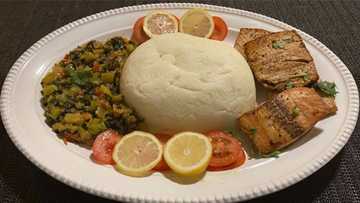Top 17 best Zulu traditional foods: meals and drinks with pictures
Nothing beats good homemade traditional foods. Those who stay true to their culture bring the food of their country with them wherever they go. Traditional Zulu cuisine mainly comprises varieties of vegetables, fruits, animal and plant proteins, and a wide range of drinks. This article shares beautiful Zulu traditional foods.
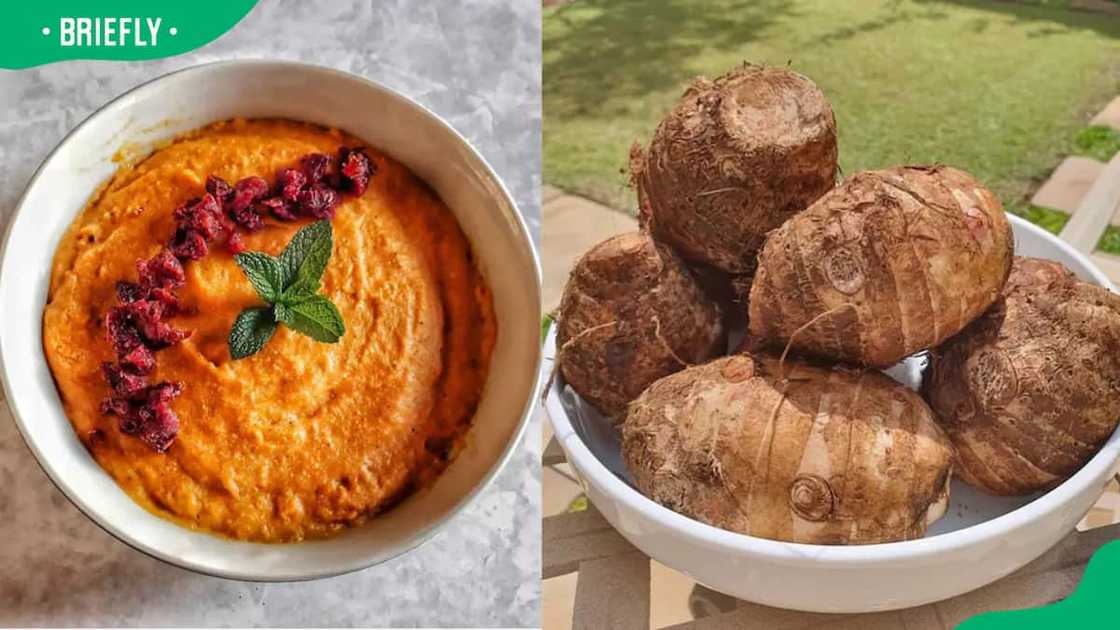
Source: UGC
Many who abandoned traditional and local food due to modernization and urbanization eventually return to it after realizing native meals are higher in vitamins, proteins, and minerals and lower in salt, fat, and sugar. If you would love to learn how to make nutritious native dishes from South Africa, compare numerous Zulu traditional food recipes you find online and use the one you understand the most. Basically, you should use the simplest recipe you can find.
Famous Zulu traditional food in South Africa
Zulu food is a significant aspect of the tribe's traditions. These meals are an expression of their cultural identity. So, high-end restaurants and hotels selling Zulu food are highly appreciated for promoting this tribe's culture. Consequently, many foreigners have fallen in with these native dishes the very first time they have a bite. Below are the 17 most popular Zulu cultural foods in South Africa:
1. Amazi/amasi
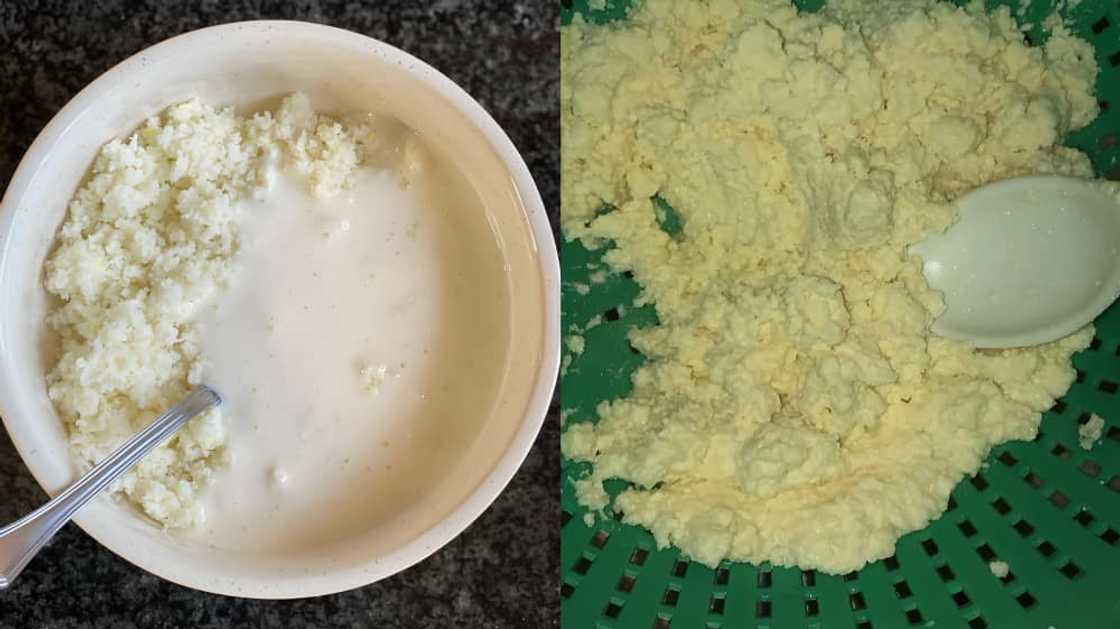
Source: UGC
South Africa's amazi or amasi is a popular traditional Zulu drink. It is curdled milk resembling cottage cheese or crumbled yogurt. Zulu people pour fresh milk in a gourd and set aside for a few days. After thickening, they separate the curd from the whey and store it for a day.
What's more, Zulu people do not regularly clean their milk gourds. Instead, they only refill the guards with fresh milk. The bacteria on the walls on the non-washed guard gives the milk a strong sour Amazi taste.
2. Uphuthu
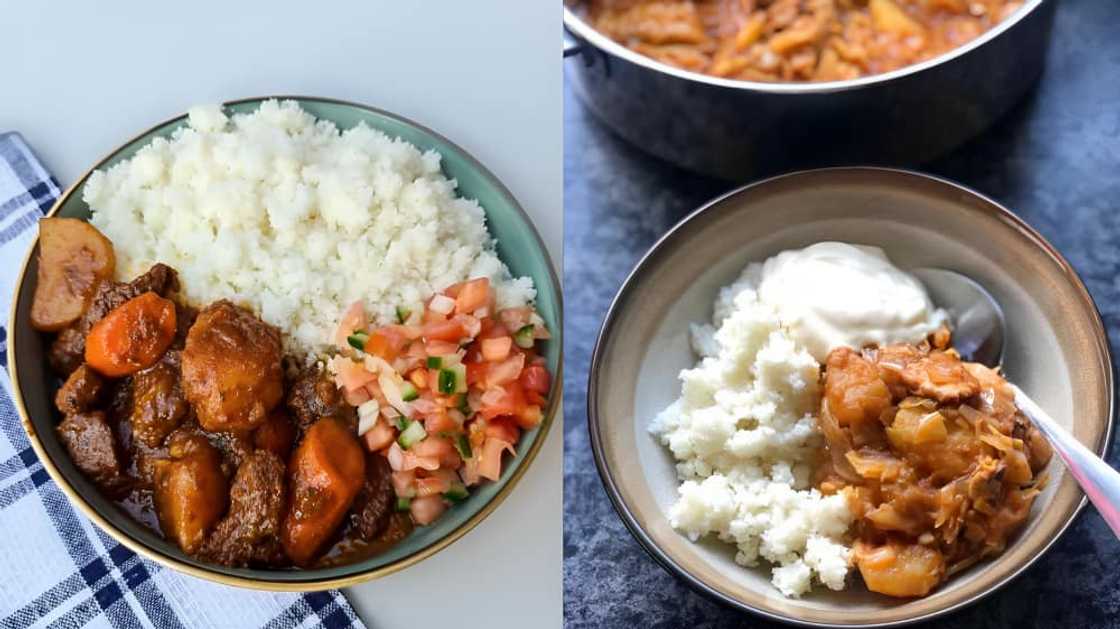
Source: UGC
Maize is a crucial part of traditional food for Zulu culture. They have many maize-based dishes, the native uphuthu being one of them. It is a thick porridge made from coarsely ground maize. The meal has a crumbly texture and is served cold with fried vegetables like spinach or meat-based dishes like fried beef or chicken.

Read also
Daughter ventures into rabbit farming business with mom after kidney disease scare, Mzansi divided
3. Amadumbe
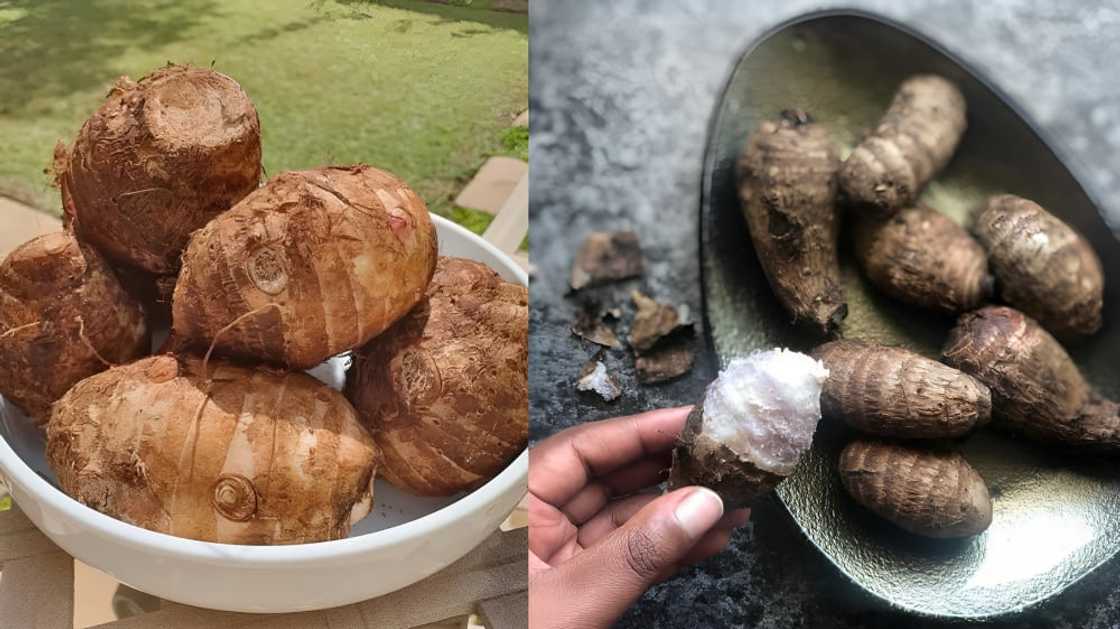
Source: UGC
Amadumbe is a legume, and it resembles sweet potatoes. These two are prepared the same way. They can be boiled, steamed, or grilled. People of all ages can eat it, but Zulu people often use mashed amadumbe as a weaning food. Today, South Africans cut amadumbe into strips and deep fry them to substitute French fries.
4. Ujeqe nobhonsisi
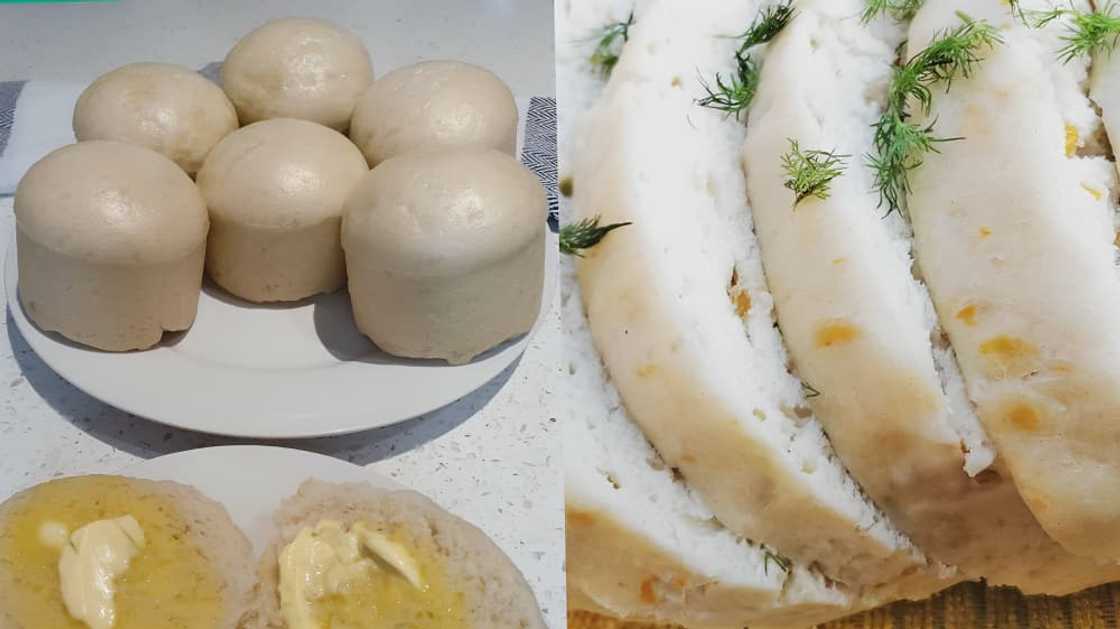
Source: UGC
Ujeqe nobhonsisi is an authentic Zulu bread, steamed and served as an accompaniment to meat or curry dishes. The meal is also known as jeqe and was traditionally prepared using freshly ground mealies, then wrapped with corn leaves before it is steamed. Modern ujeqe variants of this white Zulu bread are steamed in vegetable steamers.
5. Umqombothi
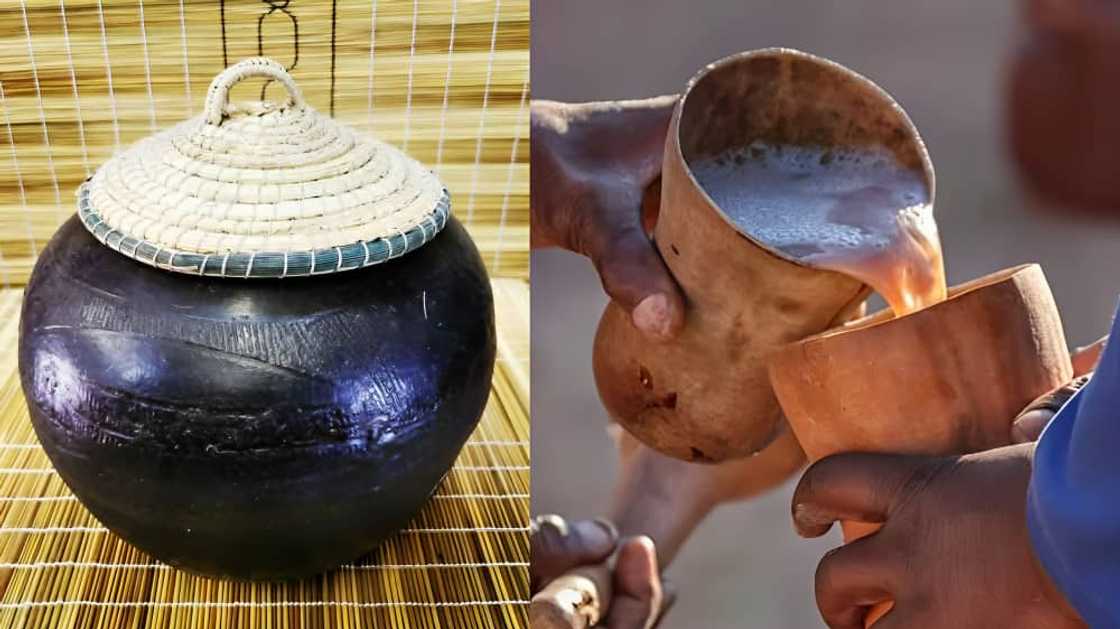
Source: UGC
Umqombothi is a traditional beer made from maize, sorghum, yeast, and water. This traditional Zulu drink is prepared in native beer pots called ukhamba. The pots are made the traditional way using clay extracted from river beds. The local umqombothi is rich in vitamin B, has a relatively low alcohol content (typically less than 3%), and is known to have a heavy and distinctly sour aroma. The drink is common in traditional Zulu weddings.
6. Chakalaka
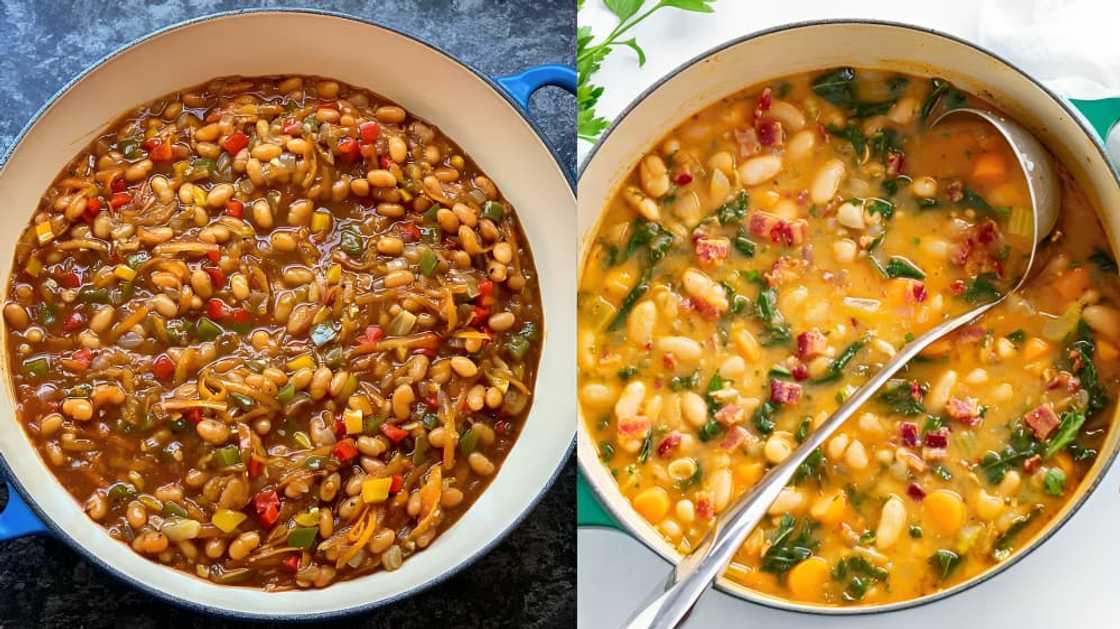
Source: UGC
Chakalaka is one of the most consumed South African dishes. Conventionally, men working in gold mines prepared this spicy tomato relish. The Zulus and other tribes across South Africa later embraced it. Chakalaka recipes vary depending on the family. Mix various vegetables and beans in one pot and add lots of tomatoes, then serve with starchy dishes like uphuthu and white steamed rice.
7. Zulu porridge (isibhede and amahewu)
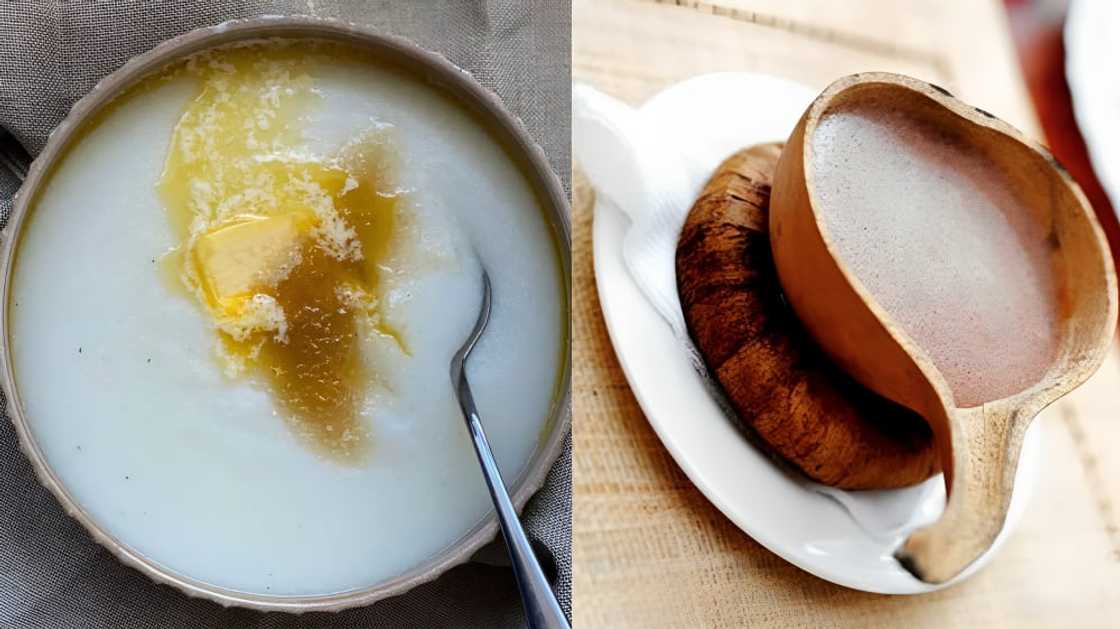
Source: UGC
Porridge commonly features in the events serving isiZulu cuisines. It is typically served out of three-legged cooking pots in Zulu villages. The native isibhede is the fermented version. Its sour taste makes the tongue tingle.
There are also other popular variants of this Zulu drink, including the iphalishi (has butter and ground beans), amahewu (millet flour sour porridge), and elimuncu (has sour milk). Zulu porridge is commonly served with spicy dishes and chunks of roasted meat.
8. Koki corn
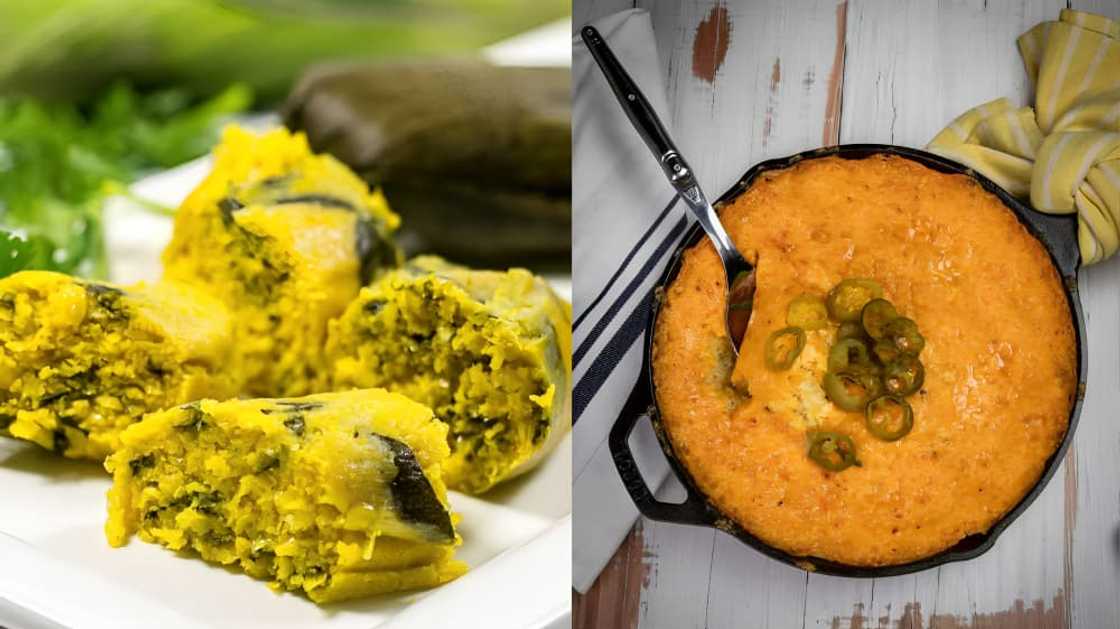
Source: UGC
Corn pudding or koki corn is similar to Mexican tamales and is among Zulu's most common desserts. The pudding is made from a mixture of fresh sweet corn grated off the cob, some water, and the milky liquid that runs from the corn kernels as they are grated. When the ingredients are heated, they thicken into a cream and should cool before eating.
9. Roast meat
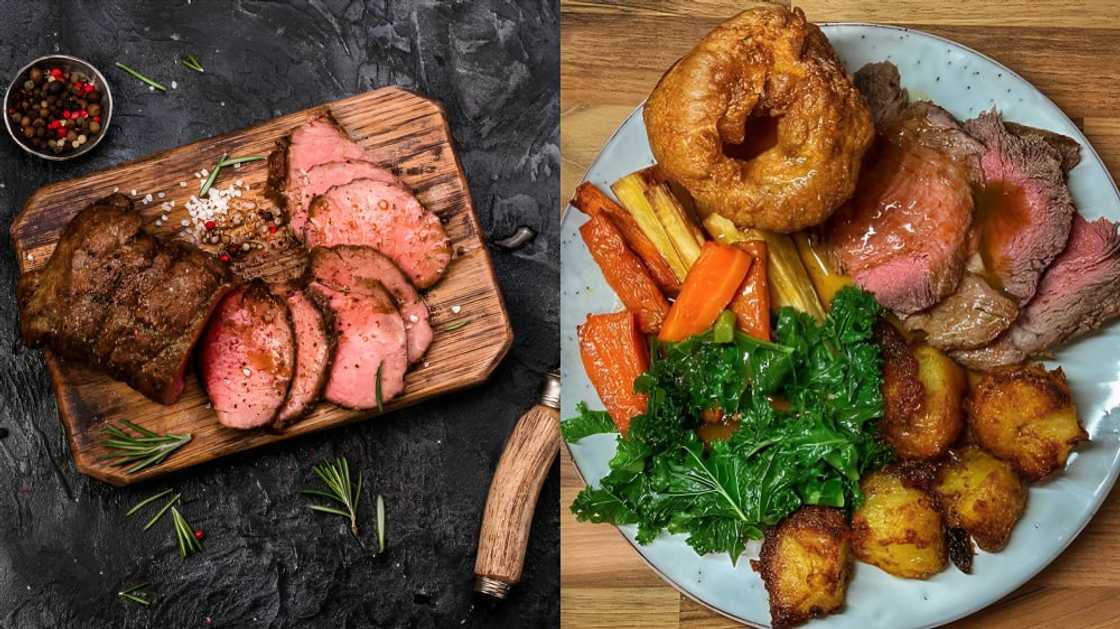
Source: UGC
The Mzansi braai, or roast meat, is the most famous traditional food for Zulu culture. They eat wild and domesticated meat with vegetable-based broths and soups. These people serve roasted meat on large wooden pans called ugqoko.
The Zulu eat a wide range of red and white meat, including mutton, beef, chevon, chicken, fish, and ducks. They also have skilled hunters who hunt buffalos, kudu, and waterbucks.
10. iDombolo/Dombolo
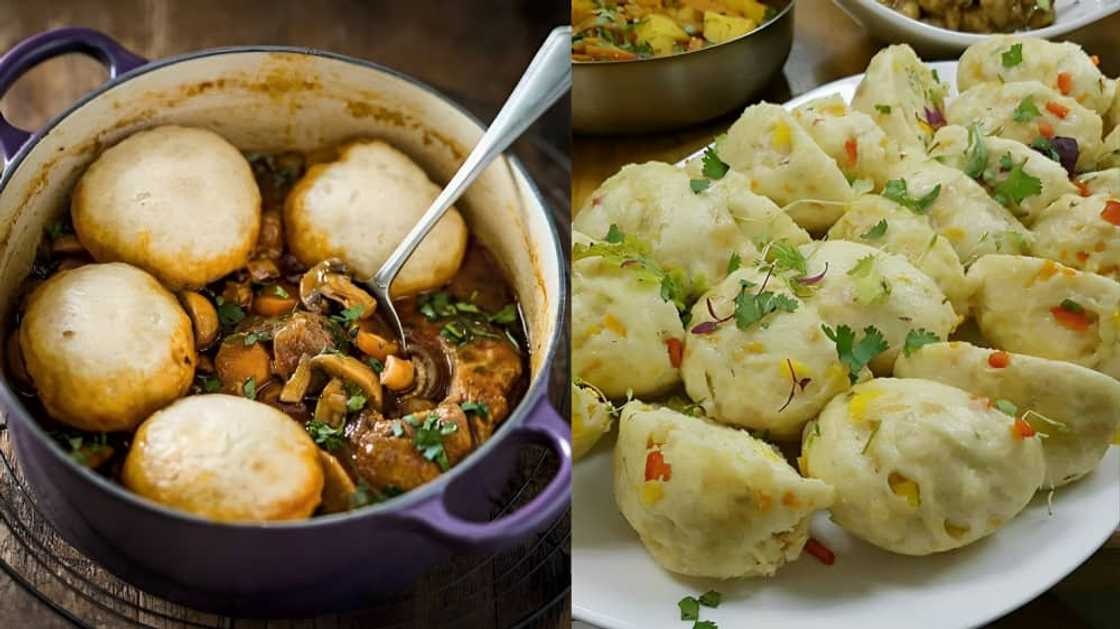
Source: UGC
iDombolo is a traditional Zulu tribe's food. Unlike traditional dumplings, you use yeast in iDombolo instead of baking powder. Zulus steam iDombolo or dombolo on top of boiling stews, while other South Africans cook it separately.
11. Idli
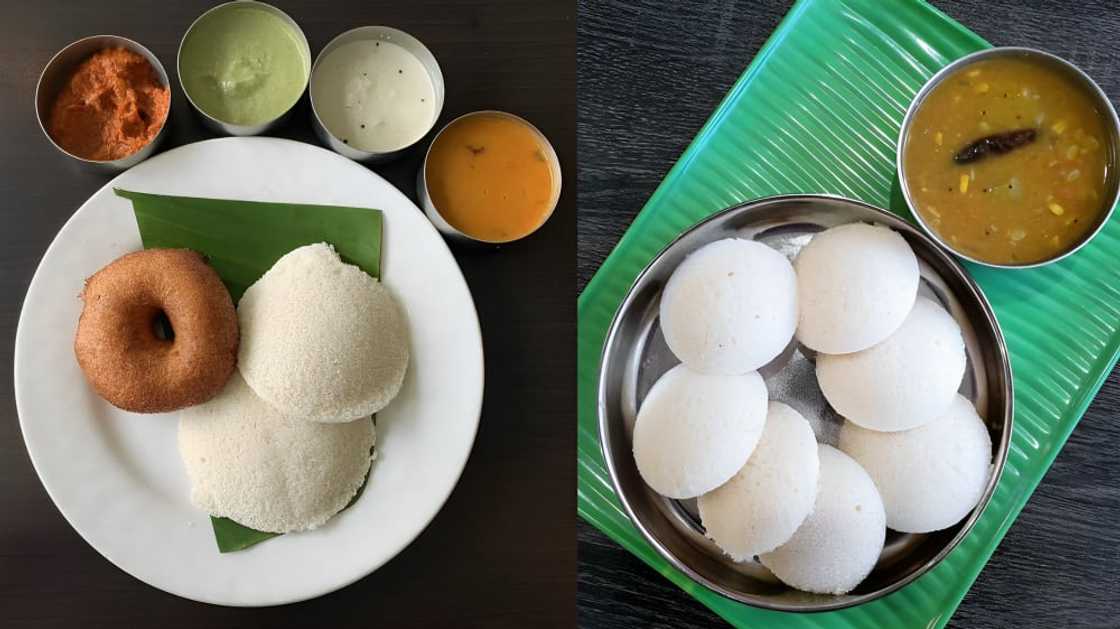
Source: UGC
You can consider adding local idli to your Zulu traditional food menu for weddings, funerals, or any other event. It is a soft and fluffy steamed rice cake made by fermenting batter from soaked rice and black grams. While the dish is quite popular amongst the Zulu people, it is said to have originated in South India (though the Indian version is spicier).
12. Umfino
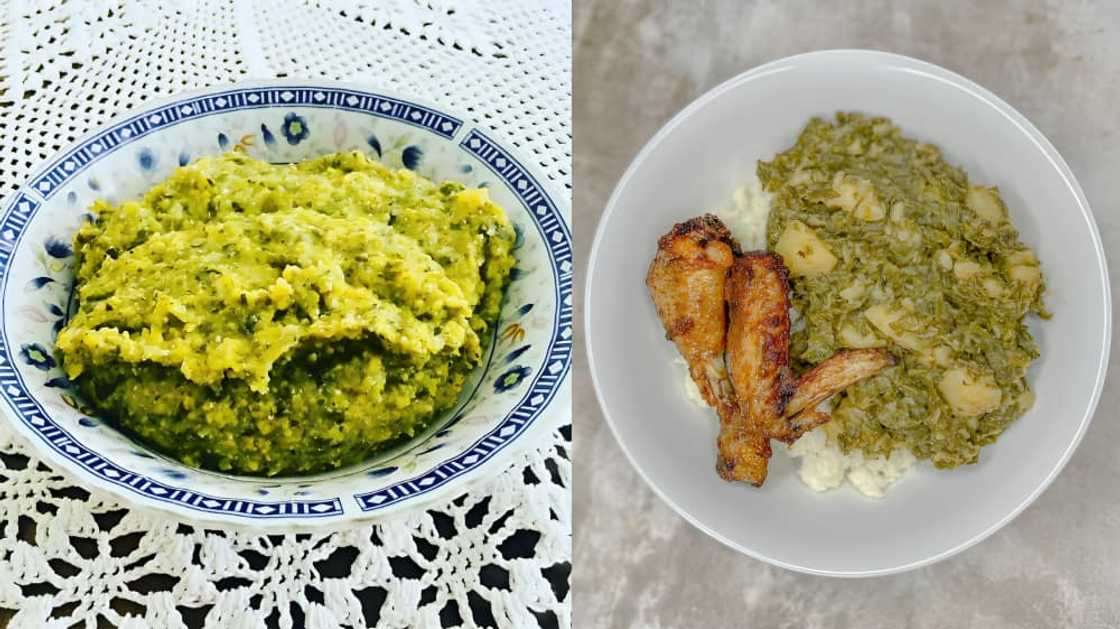
Source: UGC
Mzansi's local umfino is a cornmeal Zulu dish made from maize flour, water, spinach, and/or amaranth leaves. The leaves give this dish its characteristic green look. Umfino goes well with uphuthu and roast chicken or any other meat-based meals.
13. Isitambu
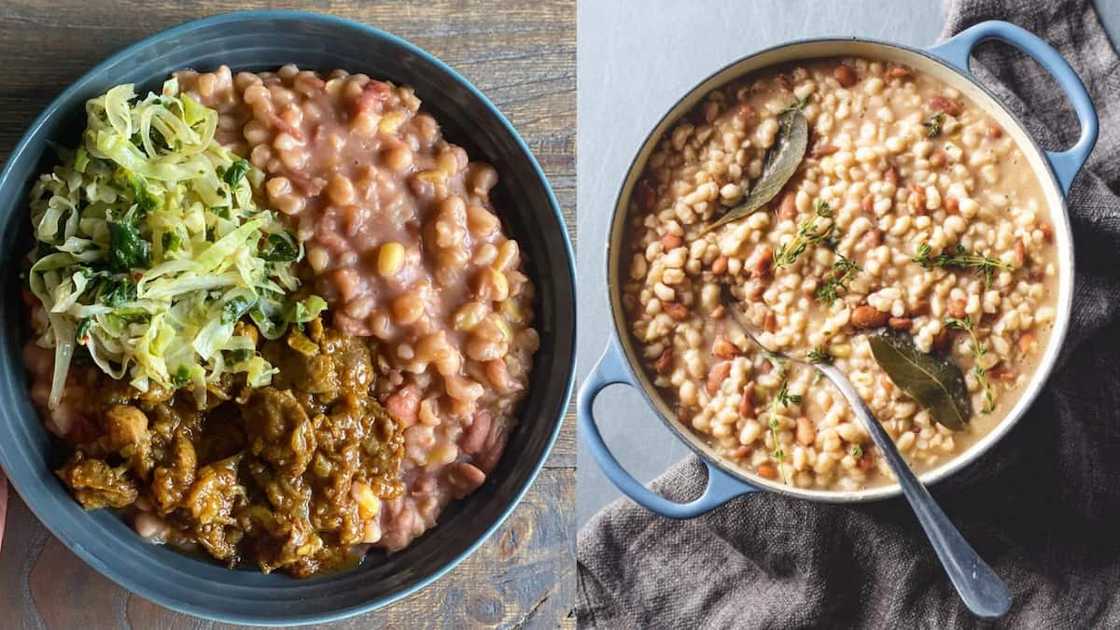
Source: UGC
Isitambu is a South African Zulu dish made of maize and sugar beans. The meal goes well with most meat-based Zulu dishes. The native isitambu is also known as umngqusho. It is a staple meal for most South African families.
14. Isijeza
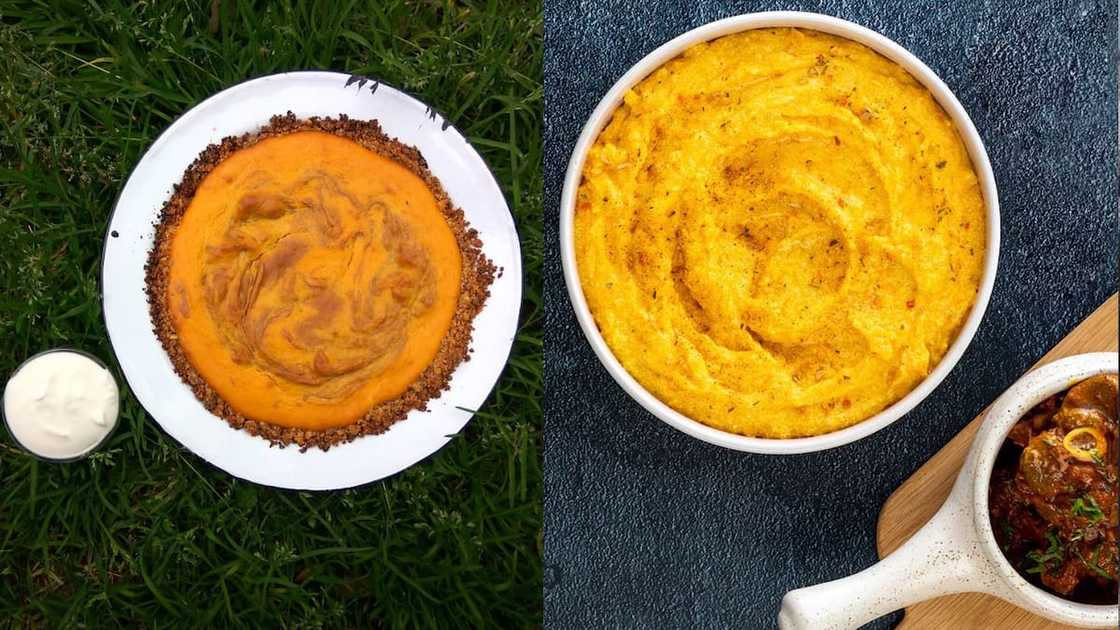
Source: UGC
Isijeza is a nutritious meal made from ithanga (pumpkin), impuphu (steamed maize with a crumb-like texture), and sugar. You can add peanut butter and macadamia to your homemade isijeza. The dish goes well with fresh milk or amazi.
15. Isijingi
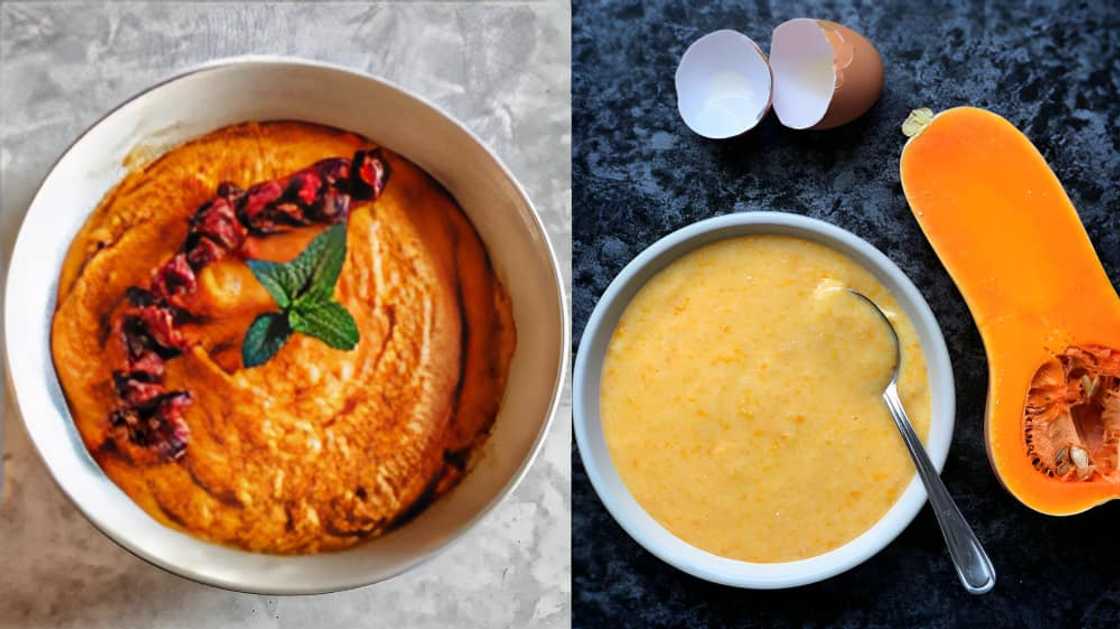
Source: UGC
The traditional isijingi is a Zulu dish made from pumpkin and maize meal. Some people add eggs to the dish. The maize meal and precooked pumpkin are added to boiling water and mashed into a fine paste. Alternatively, you can make a thick porridge instead of a fine paste. Isijingi is popularly served with beef or other meat-based delicacies.
16. Koeksisters
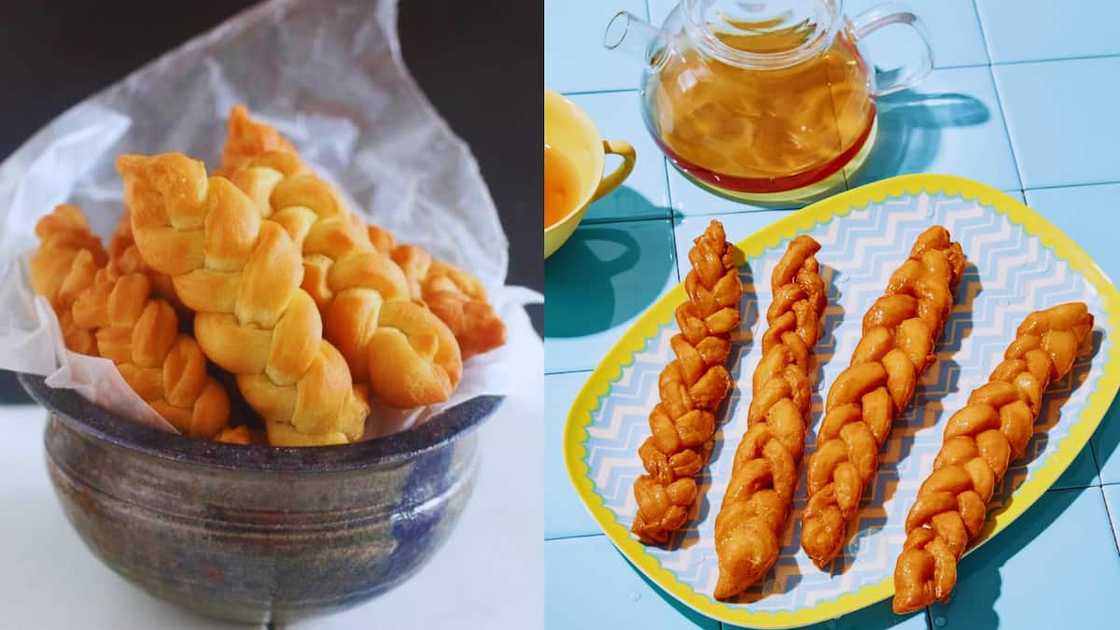
Source: UGC
Traditional koeksisters are fried dough infused with syrup or honey. They are some of the best Zulu traditional foods you will ever eat. South African koeksisters are prepared by frying plaited dough strips in oil. After that, submerse them in ice-cold sugar syrup. Their name comes from the Dutch word "koek," which means wheat flour confectionery.
17. Mogodu
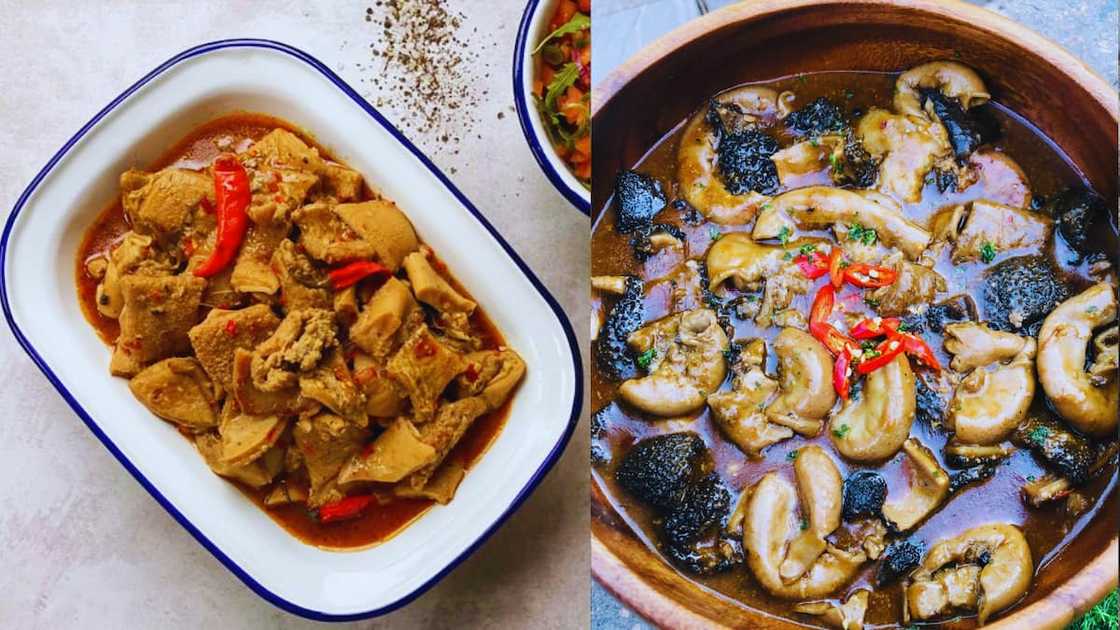
Source: UGC
Mogodu is a popular South African food, especially in the Zulu tribe. The dish is a combination of chopped serobe (tripe) and mala (intestines). The stew is served with hot pap (stiff maize flour porridge) or iDombolo dumpling. Zulu people also call this delicacy mala mogodu.
What are the best Zulu traditional food?
The most famous Zulu traditional food in South Africa are:
- Amazi/amasi
- Uphuthu
- Amadumbe
- Ujeqe nobhonsisi
- Umqombothi
- Chakalaka
- Zulu porridge (isibhede and amahewu)
- Koki corn
- Roast meat
- iDombolo/Dombolo
- Idli
- Umfino
- Isitambu
- Isijeza
- Isijingi
- Koeksisters
- Mogodu
What do Zulus eat?
The Zulu people eat communally, with several families cooking together. Most meals are cooked over an open fire in large three-legged pots. These are the most common meals, fruits, and drinks among the Zulu:
- They drink sour milk (amazi) and porridge meals like isibhede and amahewu.
- Common fruits in the Zulu nation are red milkwood, wild medlar, num-num, kei apple, monkey orange, marula, and mobola plum.
- Livestock animals eaten include goats, chickens, cows, sheep, and pigs.
- Hunted meat like fish, buffalo, kudu, and waterbucks are a large part of the Zulu diet.
- Desserts found at Zulu meals include melk terts, dried fruit leathers, fried dough koeksisters, and spiced cookies.
- Zulu women brew traditional beer using the native mobola plum, sorghum, and maize.
What are the traditional foods in KwaZulu Natal?
Popular Zulu traditional food names you will come across in this province are mogodu (tripe), amadumbi (Zulu potatoes), walkie-talkies (boiled chicken feet), and pap (stiff maize porridge).
What is usually served on a Zulu traditional wedding food menu?
When planning a Zulu traditional wedding food menu, most couples and their families budget for meals like:
- Umqombothi (traditional beer)
- Uphuthu (thick maize flour porridge)
- Pap (stiff maize flour porridge)
- Amazi (sour milk)
- Roast meat
- Ujeqe (steamed bread)
Zulu traditional food is easy to make. In ordinary households, the staple dish would be maize meal, vegetables, and meat (inyama). Native stews and casseroles are among people's favorite Zulu foods because they are inexpensive and can feed many in one sitting. There are many pictures of traditional South African food online. You can always look them up to know how the dish looks.
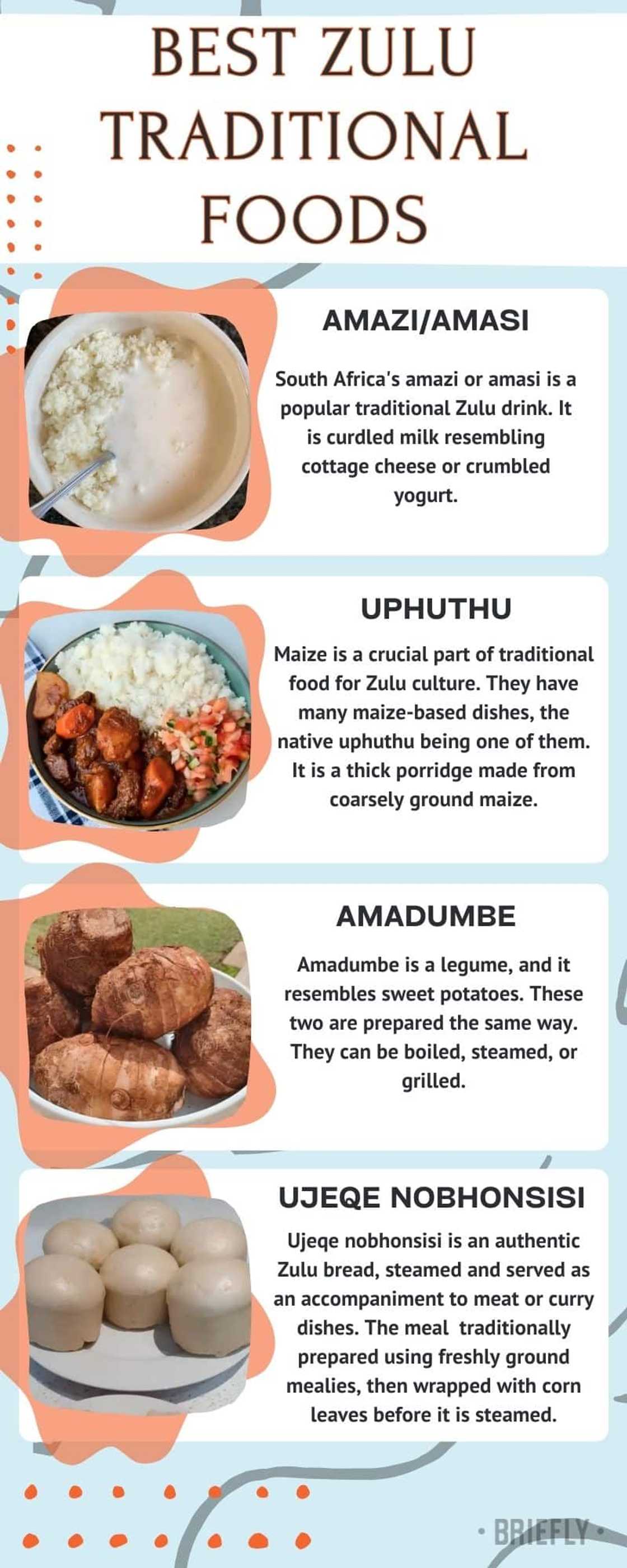
Source: Original
Briefly.co.za published a list of the most expensive African cities. The continent has undergone drastic changes and development in the past few decades, with various countries and cities emerging as economic, financial, and tourism powerhouses.
As the African nations develop, the living standards and cost of life in some of their cities continue to rise. Today, some African cities are as expensive as their European, Asian, or American counterparts. Some of the contributing factors include the cost of housing, transport, health, and education.
Source: Briefly News

Peris Walubengo (Lifestyle writer) Peris Walubengo has vast experience in search engine optimization through digital content generation, research, editing, and proofreading. She joined Briefly.co.za in November 2019 and completed the AFP course on Digital Investigation Techniques. You can email her at perisrodah254@gmail.com.

Jackline Wangare (Lifestyle writer) Jackline Simwa is a content writer at Briefly.co.za, where she has worked since mid-2021. She tackles diverse topics, including finance, entertainment, sports, and lifestyle. Previously, she worked at The Campanile by Kenyatta University. She has more than five years in writing. Jackline graduated with a Bachelor’s degree in Economics (2019) and a Diploma in Marketing (2015) from Kenyatta University. In 2023, Jackline finished the AFP course on Digital Investigation Techniques and Google News Initiative course in 2024. Email: simwajackie2022@gmail.com.

